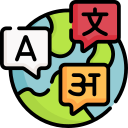
In my previous article, I talked about the challenge of learning a new language, especially in the context of translation studies. Now I’d like to tackle a debate between my mother tongue and my second languages, because many like me have struggled to choose or rather consider one or the other as their primary language.
I am Lebanese which de facto means my mother tongue is Arabic. Nevertheless, given the context and cultural background of this country, the first words I spoke were French. Why? Well simply because my parents wanted me to. Many more Lebanese children like me were spoken to in French or English rather than Arabic since our parents believed this would lead us to have better educations. Ultimately, in my case, I became quite fluent in both foreign languages, but I also ignored my mother tongue and suffered the consequences later on.
Having studied in a school with a French education-based system, Arabic was of much lesser importance, it never bothered me or even interested me back then. It’s only when I decided what I wanted to do with my life, become a translator, and enrolled into university, that I realised I should’ve cherished my mother tongue and worked a bit harder on it all those years ago. During the past five years, I felt like I had to learn Arabic all over again, as if it was a foreign language I barely grasped, whereas I had become too comfortable with French and English.
In retrospect, I learned that Arabic is important, not only because it is my mother tongue but also because it can open new doors for me in the scope of my career. Both French and English are essential requirements in my field, but Arabic has to have the upper hand because it also defines who I am, it’s part of my identity now more than ever before and I encourage anyone who possesses it as their mother tongue not to neglect it but to respect it and develop it instead.